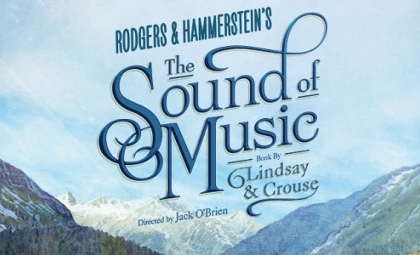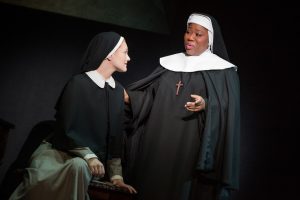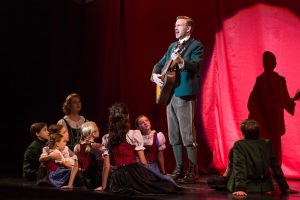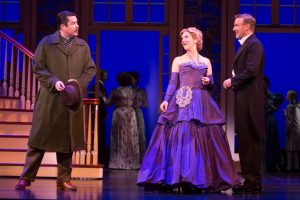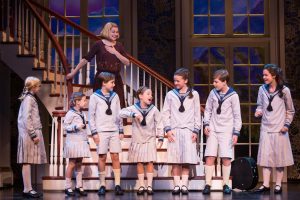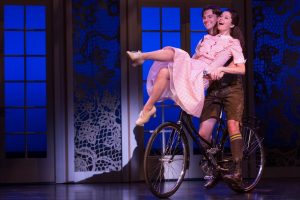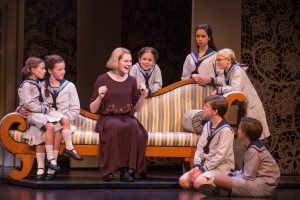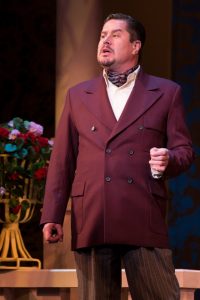EV’RY MOUNTAIN GETS CLIMBED AGAIN
It’s fitting that Rodgers and Hammerstein’s final collaboration is a tribute to the art and craft they served so well’”music and singing. Like Mary Poppins, convent girl Maria Rainer is a very nice nanny (minus umbrella) who teaches by example and uses play to build courage and confidence. Fraulein Rainer worships through notes inspired by the mountains around Salzburg. Her non-negotiable adoration for his seven children (and her unspoken ardor for himself) wins the heart of crusty sea captain Von Trapp. Maria’s domestication of this military-minded household is so sweetly told that it almost needs the Nazis as a counterbalance of evil.
Of course, this is (more or less) the story of how the Trapp Family Singers escaped from the 1938 Nazi “anschluss” (the not so peaceful annexation of Austria), giving up the family manse for freedom in America. It would be too good to be true if it weren’t both.
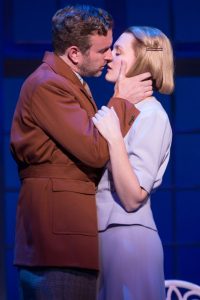 A show as basic as its title, this thinking confection trades in elemental choices’”God over love, honor over fatherland, art over profit. Its ending’”with the Von Trapps leaving forever the homeland whose music they embodied’”inevitably reminds you of the equal exiles of Anatevka in Fiddler on the Roof, another journey to America where no liberty was left behind.
A show as basic as its title, this thinking confection trades in elemental choices’”God over love, honor over fatherland, art over profit. Its ending’”with the Von Trapps leaving forever the homeland whose music they embodied’”inevitably reminds you of the equal exiles of Anatevka in Fiddler on the Roof, another journey to America where no liberty was left behind.
Easily underestimated, The Sound of Music works on many levels–as a love story that combines Maria’s first romance with the Captain’s second chance, a coming-of-age narrative for Liesl and her Nazi-leaning Rolf, and a spun-sugar fantasy about a perfect family who sing their way to freedom and success. And, of course, the Von Trapp exodus really happened, reason enough to take this on faith. A country may be desecrated but a family is renewed.
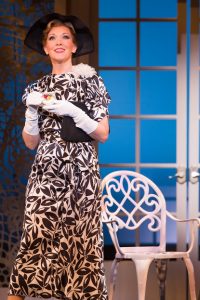 In nearly three hours Jack O’Brien’s faithful and sometimes impassioned revival (which borrows two songs from the celebrated film version), a national tour now playing the Palace Theatre, charms and convinces with every well-shaped scene. (Douglas W. Schmidt’s Alpine cyclorama, filigreed finery for the Trapp Villa, and Gothic set pieces for Nonnberg Abbey prove remarkably pictorial as needed.)
In nearly three hours Jack O’Brien’s faithful and sometimes impassioned revival (which borrows two songs from the celebrated film version), a national tour now playing the Palace Theatre, charms and convinces with every well-shaped scene. (Douglas W. Schmidt’s Alpine cyclorama, filigreed finery for the Trapp Villa, and Gothic set pieces for Nonnberg Abbey prove remarkably pictorial as needed.)
Preternaturally perky and cock-eyed with optimism (but that comes with this territory), Kerstin Anderson seems a bit too worldly wise for a naïve novice who just joined a convent. But then the original Maria, Mary Martin, was also too ripe to be real. Anderson won’t make us forget Julie Andrews (who could?), but she proves as humble as she is plucky in her wonder-working. More crucially, Anderson solidly grounds this unfinished Maria (whose past we never learn): She weighs the security of the abbey against the adventure of love in a schloss and the sudden, unsought responsibility of unofficial motherhood.
A consummate pro, Ben Davis somewhat rigidly registers the captain’s change from pining and overcompensating widower to a life-loving music man and remade dad. But the all-conclusive “Edelweiss” never quite comes off as a lament for a broken homeland, much as “Tomorrow Belongs to Me” suggests what might have been in Cabaret. Melody Betts digs dignity, depth and a soaring soprano from the omnipotent Mother Abbess: She radiates bravery in the inarguable pep talk of “Climb Ev’ry Mountain,” the magnificent anthem of uplift that inevitably becomes a literal escape plan. The Trapps will not be trapped.
Their worth requires a sardonic counterweight: As the exemplars of compromise and corruption, Teri Hansen makes a suitably cold but not merry widow as Elsa Schraeder and Merwin Foard brings broad verve to venal Max Detweiler. (In “There’s No Way to Stop It,” they absurdly compare the Nazi takeover to the earth’s rotation, as if human folly is ever that inevitable.)
Paige Silvester makes an endearing teenage Liesl but Dan Tracy is, like our Maria, a tad too mature to depict her supposedly dashing Aryan dream boy Rolf Gruber, a walking Nazi poster boy. Finally, the sisters of this very artistic abbey carry the show’s title to heaven and back, while the Von Trapp children are as patently irresistible as ever. Whatever dancing you get here is entirely believable’”no show biz showing off, though the children (who here come in alternating sets of adorability) can’t conceal their own irrepressible joy at just doing what comes naturally.
To the director’s credit, this is a tad darker Sound of Music than past productions or the sometimes saccharine film. The Nazi invaders who demand the Captain’s loyalty to the wrong country are clearly thugs in uniform (1938 reflecting ahead to 2016?). The swastikas hanging over the Kaltzberg concert hall stage utterly destroy any phony nostalgia the show might borrow.
The Sound of Music
Grove Entertainment and Ted Chapin
presented by Broadway in Chicago
Cadillac Palace, 151 W. Randolph St.
ends in Chicago on June 19, 2016
tour continues into 2019
for dates, cities, and tickets,
visit Sound of Music Tour
